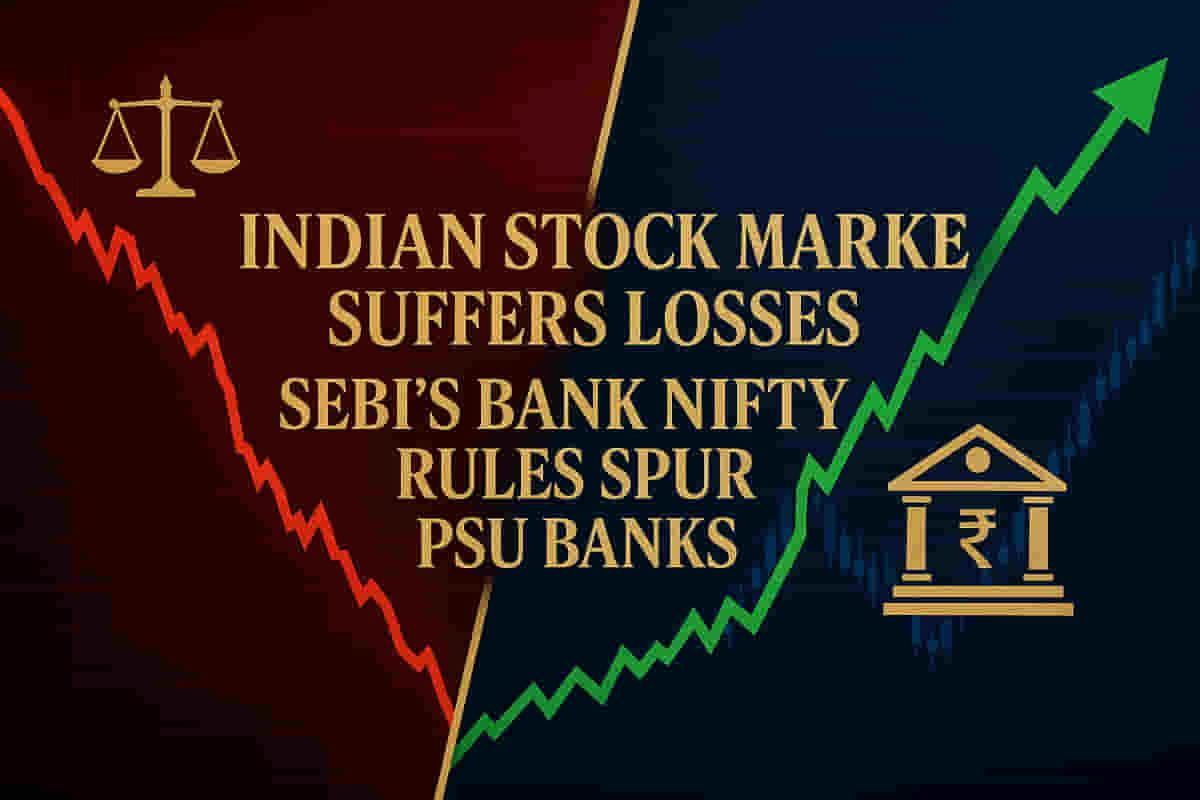Indian Markets End Bearish as SEBI's Bank Nifty Reforms Boost PSU Banks Amidst Profit Booking
Economy
|
31st October 2025, 11:43 AM

▶
Stocks Mentioned :
Short Description :
Detailed Coverage :
Indian equity markets concluded the trading week on a bearish note, with the Sensex closing down 465.75 points at 83,938.71 and the Nifty50 dropping by 0.60% to 25,722.10. Major drags on the market included stocks like Eternal, NTPC Limited, and Cipla Limited, which declined by 3.45%, 2.52%, and 2.51% respectively. In contrast, Bharat Electronics Limited, Eicher Motors Limited, and Shriram Finance Limited experienced gains of nearly 4%, 1.81%, and 1.78% respectively, driven by strong second-quarter financial performance.
A significant development occurred in the banking sector as the Securities and Exchange Board of India (SEBI) introduced new regulations for the Bank Nifty index. These changes mandate a minimum of 14 constituents, up from 12, and cap the weight of the top constituents at 20% (down from 33%) with the combined weight of the top three not exceeding 45% (down from 62%). This news was well-received by Public Sector Undertaking (PSU) banks, with shares of Union Bank of India soaring 4.24%, Canara Bank rising by 2.86%, and Punjab National Bank gaining 2.30%. However, the broader Nifty Bank index declined by 0.4%, with Kotak Mahindra Bank Limited, HDFC Bank Limited, and ICICI Bank Limited being the top laggards.
Other sectoral indices like Nifty Media and Nifty Metal also experienced declines, falling up to 1.32%. The Nifty Oil and Gas sector was an exception, ending in the green, with Indian Oil Corporation Limited and Hindustan Petroleum Corporation Limited rising by nearly 1.75%.
In the broader markets, the Midcap index fell by 0.45%, and the Small-cap index declined by 0.48%. The India VIX remained neutral, with a marginal rise of 0.70%.
Analysts at Bajaj Broking Research attributed the decline in Indian equities primarily to profit booking, suggesting that positive domestic cues have already been factored into stock prices. They also noted that the US-China trade tensions, despite a brief pause, continue to cast a shadow of macroeconomic uncertainty over global markets, impacting investor sentiment.
Impact This news highlights current market volatility and investor sentiment influenced by both domestic factors (profit booking, Q2 results) and global macroeconomic uncertainties. The SEBI's regulatory changes for the Bank Nifty are a key development for the banking sector, aiming to improve index diversification and stability. The positive performance of PSU banks suggests potential investor confidence in this segment, while the mixed performance across sectors indicates a cautious market approach. The booming luxury market indicates strong consumer spending among a segment of the population, reflecting economic growth. Rating: 7/10 Heading: Definitions PSU Banks: Public Sector Undertaking Banks, which are banks where the majority stake is held by the Government of India. Bank Nifty: A sectoral index that represents the banking industry in India, comprising the most liquid and large Indian banking stocks. SEBI: Securities and Exchange Board of India, the regulatory body for securities and the securities market in India. Nifty50: An index representing the weighted average of 50 of the largest Indian companies listed on the National Stock Exchange of India. Sensex: A stock market index of 30 well-traded large-cap, well-established companies listed on the Bombay Stock Exchange. Midcap Index: An index that tracks the performance of mid-sized companies in the stock market. Small-cap Index: An index that tracks the performance of small-sized companies in the stock market. India VIX: A volatility index based on the Nifty50 index options, often referred to as the 'fear index'. Q2: The second quarter of a financial year, typically from July to September. Macroeconomic Uncertainty: Uncertainty regarding the future performance of the economy, often related to factors like inflation, interest rates, and geopolitical events.